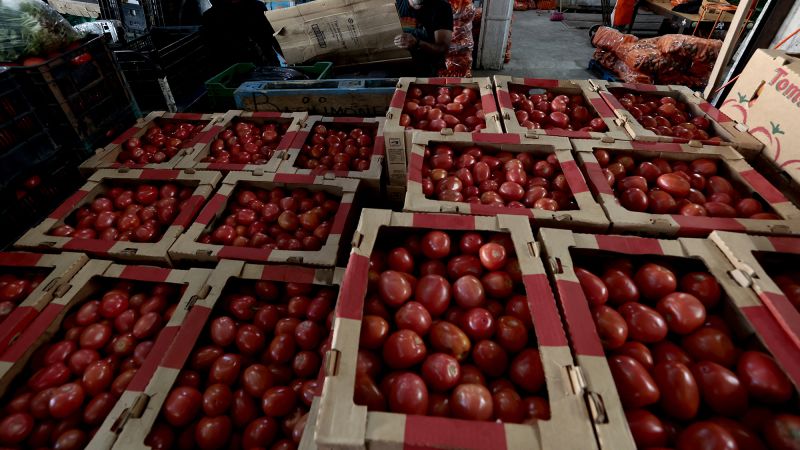The looming specter of new tariffs on Mexican tomatoes is creating waves of concern among small business owners across the United States. Teresa Razo, the owner of two Argentine-Italian restaurants in Southern California, expresses this worry candidly, predicting that her establishments could face financial ruin within a mere three months if tomato prices continue to escalate due to these tariffs. This potential financial turmoil highlights not just Razo’s predicament, but also the broader implications for the restaurant industry and consumers who rely on affordable produce for their meals.
Set to take effect on July 14, the proposed 20.9% tariffs arise from changes to a nearly three-decade-old US-Mexico trade agreement, raising fears that grocery prices could soar, impacting everything from family dinners to professional kitchens. Consumer goods like pizza, hamburgers, and even salads could bear the brunt of the increased costs, prompting restaurant owners like Razo to rethink pricing structures and customer engagement strategies. The combination of these tariffs and inflationary pressure has left many, including Razo, feeling vulnerable about the sustainability of their businesses.
The situation is made more complicated by President Donald Trump’s erratic tariff policies, which have disrupted global trade relations. Amid this uncertainty, business owners are finding it increasingly challenging to create stable financial forecasts. Professor Timothy Richards from Arizona State University anticipates a 10% price increase in tomatoes due to the tariffs, alongside a predicted 5% drop in consumer demand. Such shifts can have a substantial cascading effect on smaller businesses that rely heavily on stable supply and pricing.
As it stands, the United States represents the largest market for Mexican tomato exports, a fact underlined by a report from the US Department of Agriculture that suggests these tariffs could lead to a significant reduction in tomato imports. While some US growers are advocating for these tariffs as a necessary measure against “dumping,” or the strategy of underpricing local products to gain market share, the subsequent economic consequences for retailers and consumers remain daunting.
Historically, the Tomato Suspension Agreement, established in 1996, was seen as a safeguard for US tomato growers. Its withdrawal by the Commerce Department, citing a failure to adequately protect American producers, shifts the landscape. Robert Guenther, from the Florida Tomato Exchange, argues that previous agreements have not sufficiently stopped practices detrimental to US farmers. However, this sentiment is contested by figures like Walberto Solorio, president of the Baja California Agricultural Council. He contends that while certain violations exist, they do not justify dismantling the entire agreement.
For countless consumers and businesses, the immediate impact is palpable. Razo notes that individuals who dined out frequently may reconsider their habits due to rising costs. In her own restaurants, Villa Roma and Cambalache Grill, tomatoes are essential for staple dishes like salads and marinara sauce, making the potential for price hikes a serious threat to revenue. Conversely, some companies, including major firms like Heinz, assert they use domestically sourced tomatoes, sparing them from tariff-induced price increases.
Despite this, not every small establishment can absorb the cost of such price increases. Razo has turned her attention toward finding domestic sources for her tomatoes but worries about finding them quickly. The unpredictability of tariff changes has also affected her emotional well-being, choosing to take a more measured approach while grappling with feelings of instability and fear.
Similarly, Justin De Leon, co-owner of Appollonia’s Pizza in Los Angeles, explains his struggle with rising prices. Utilizing both Mexican tomatoes for fresh toppings and California tomatoes for sauces, he oscillates his sourcing based on produce availability and cost-effectiveness. Increased tariffs on essential ingredients, like cheese, add more complexity to operating costs.
In conclusion, the consequences of implementing tariffs on Mexican tomatoes affect not just business owners but resonate throughout the wider economy. Conversations around trade agreements and pricing are critical, as they reflect the interconnected nature of agricultural commerce, consumer behavior, and the broader economic landscape. All parties – from small business owners like Razo and De Leon to agricultural producers in Mexico – will continue to navigate this evolving environment as they seek sustainable solutions amid uncertainty. Ultimately, the hope remains that an end to this tumultuous phase is on the horizon, as restaurateurs and consumers alike seek stability.








